Charles E W Bean, Diaries, AWM38 3DRL 606/247/1 - 1917 - 1933 - Part 5
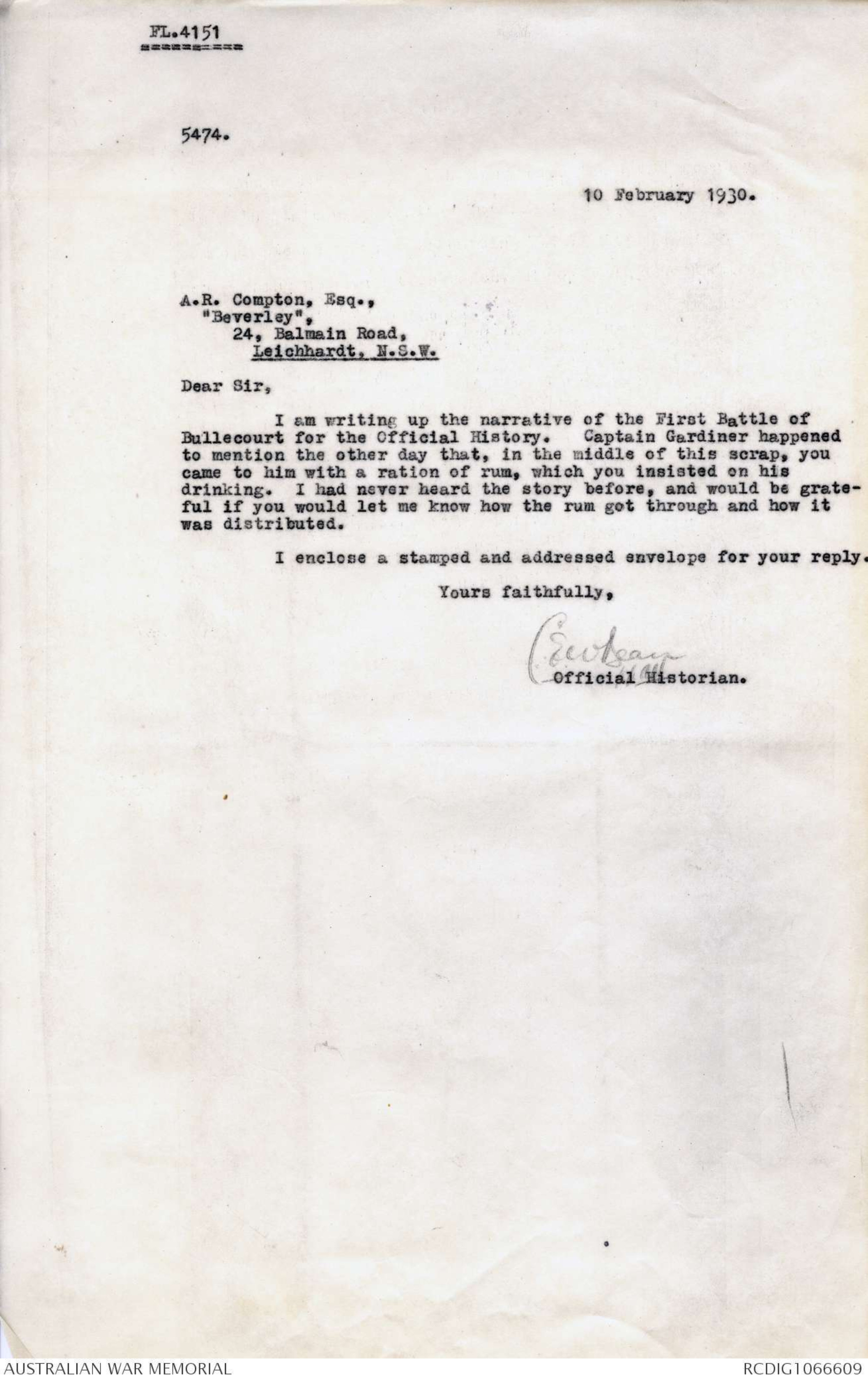
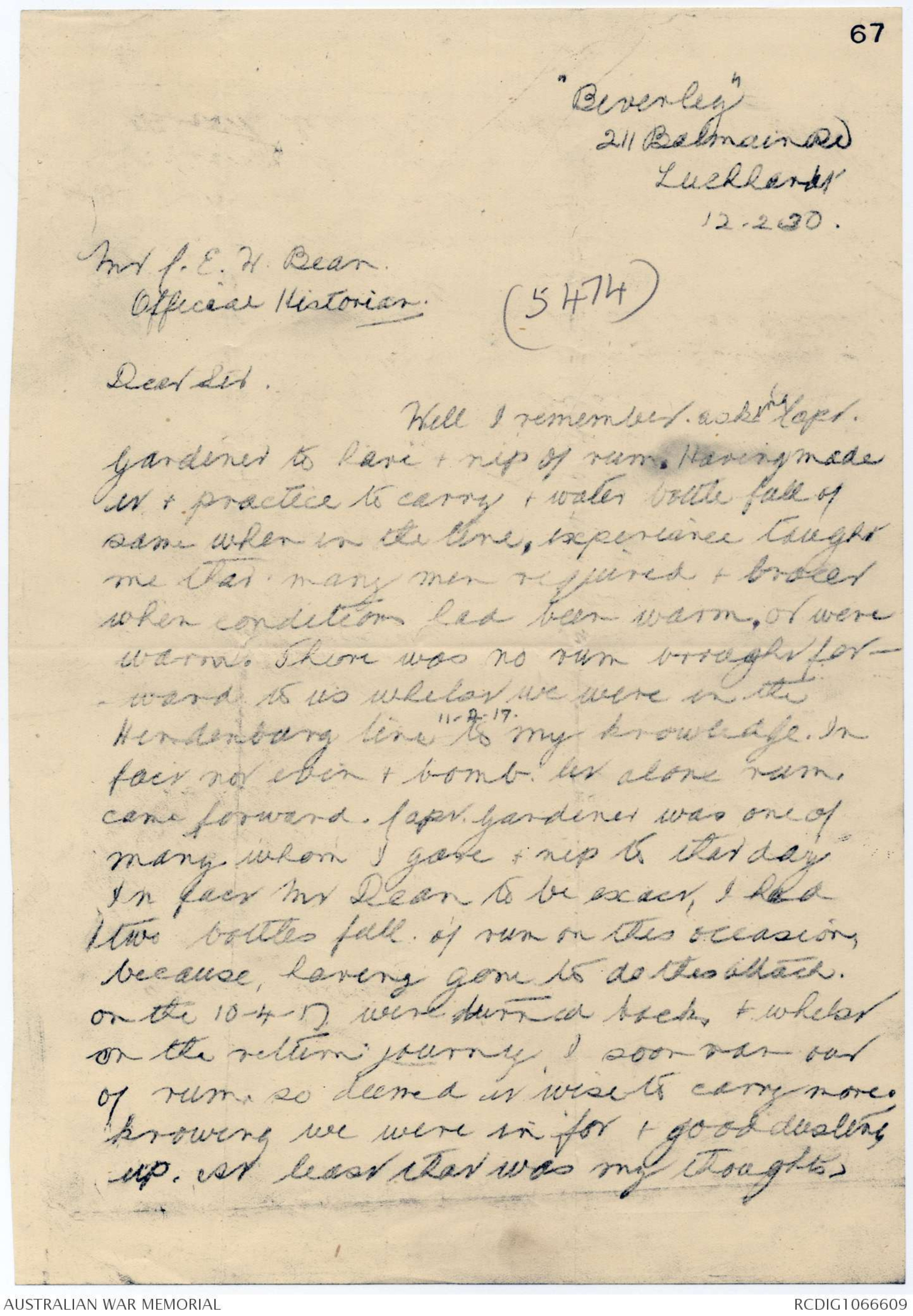
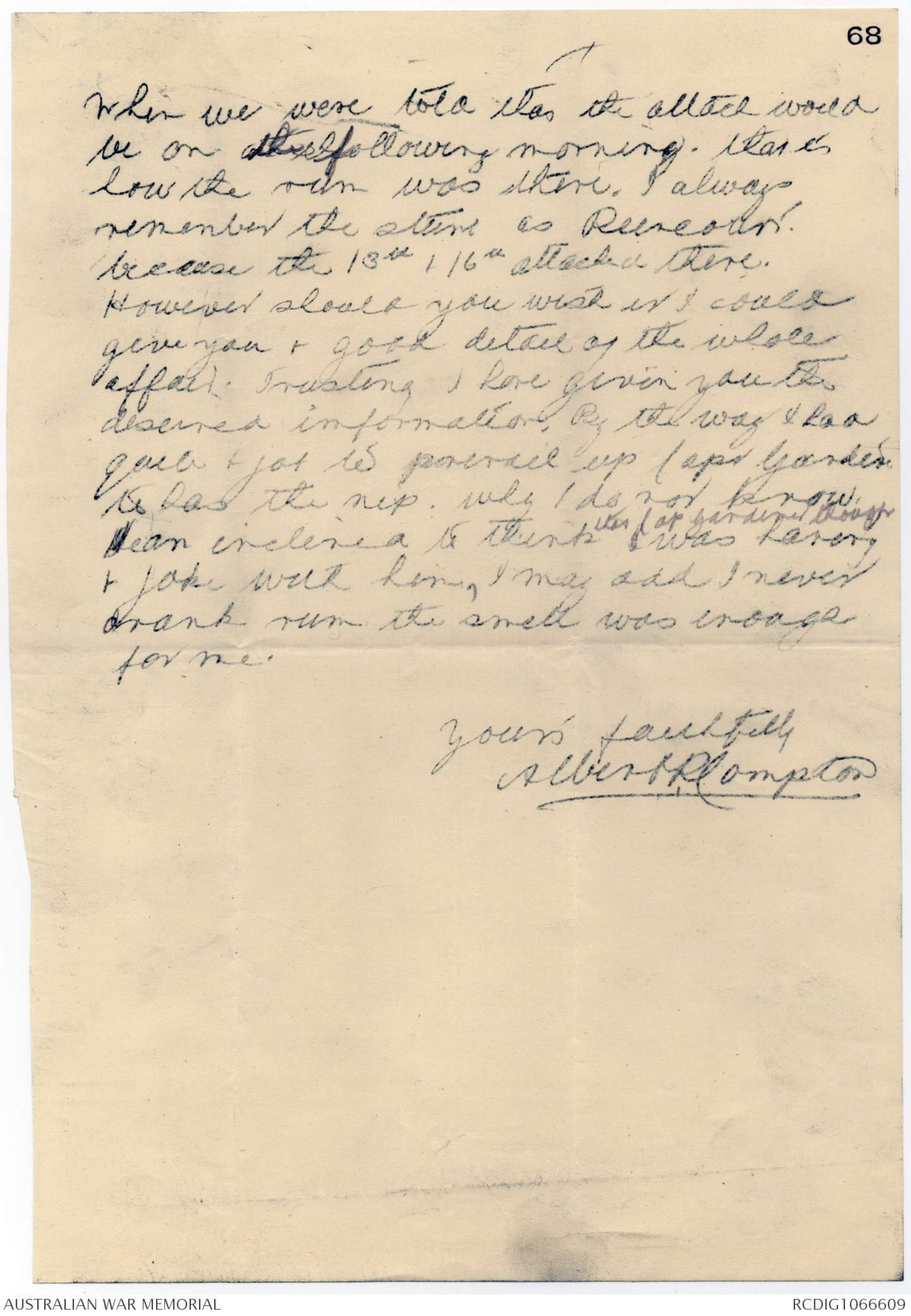
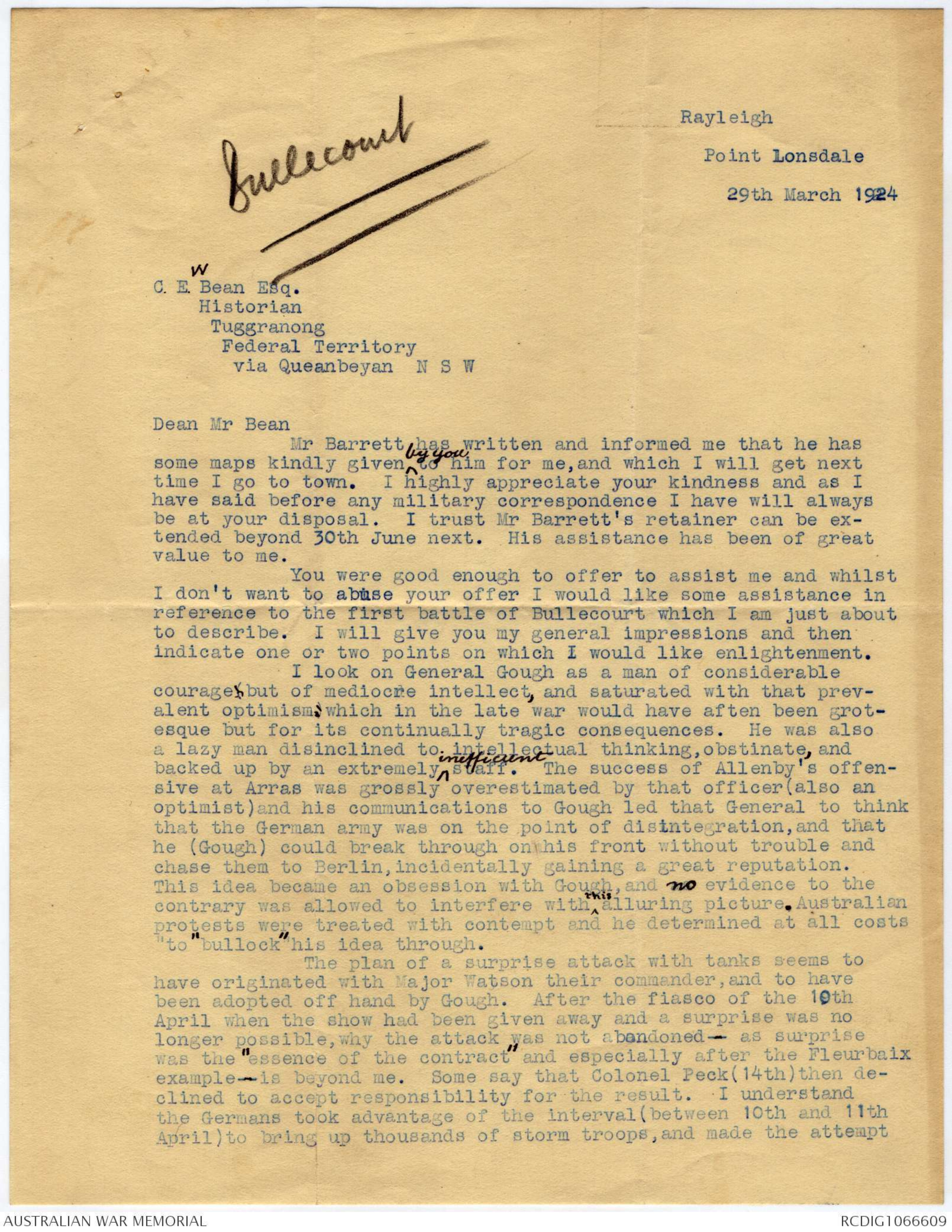
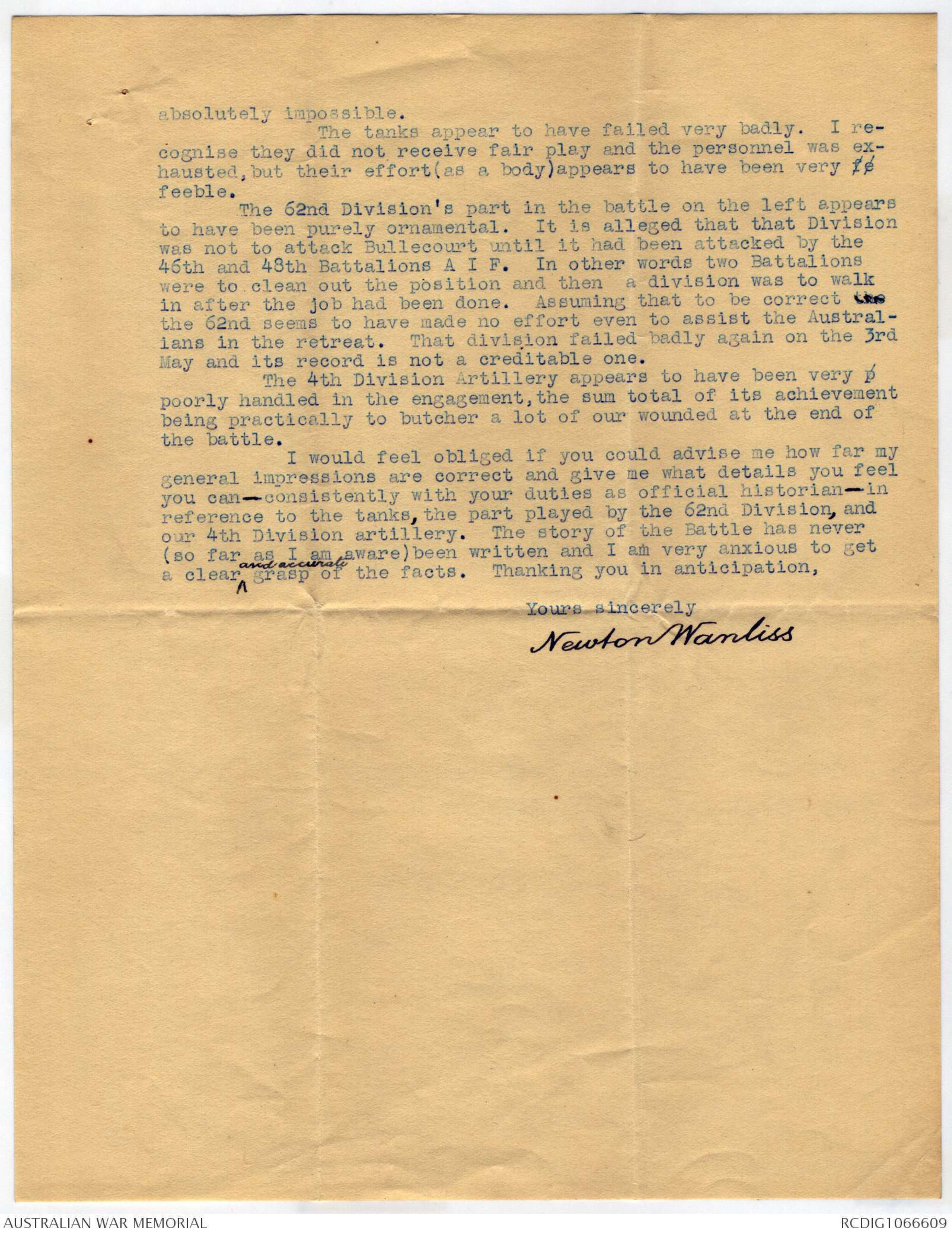
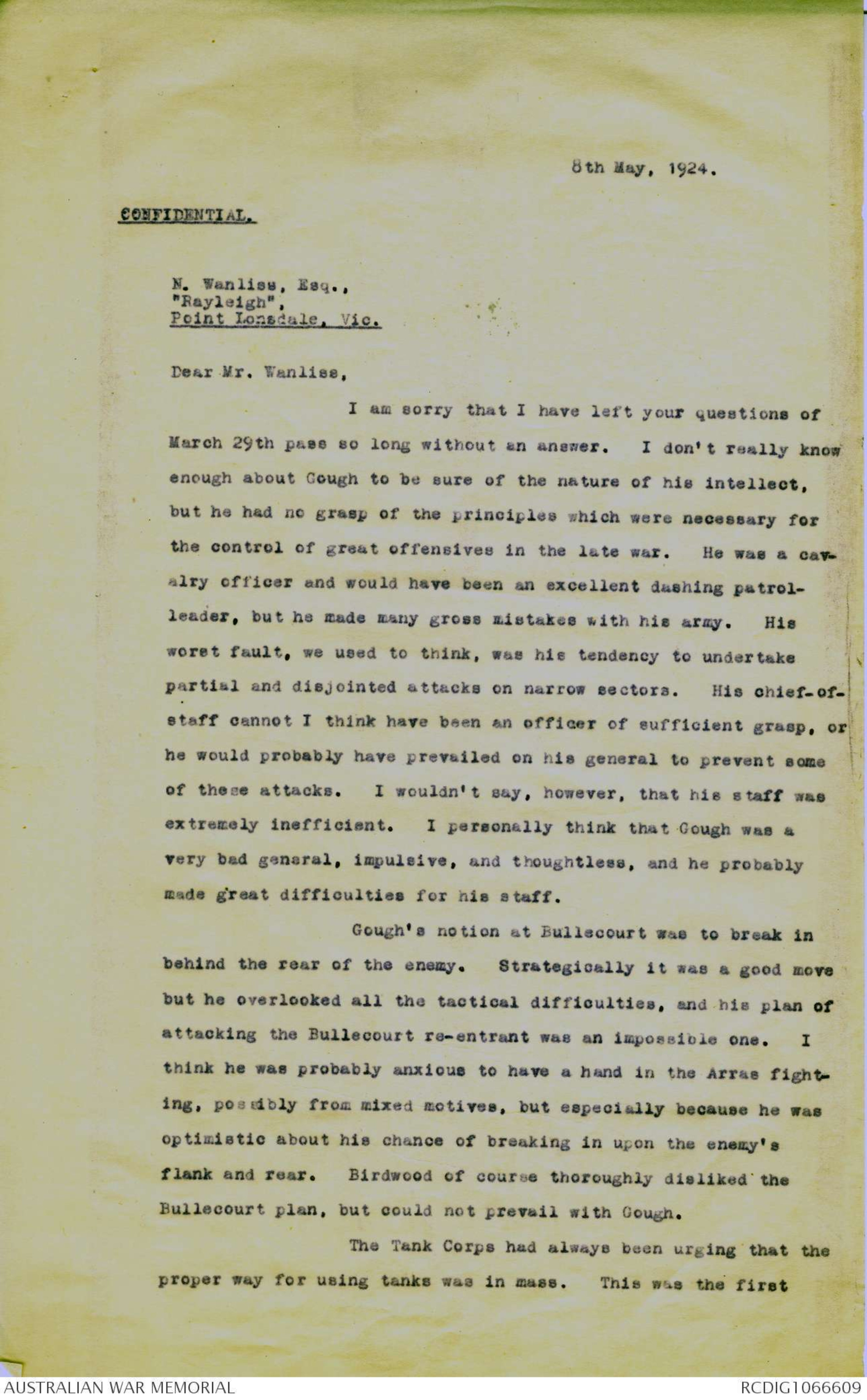
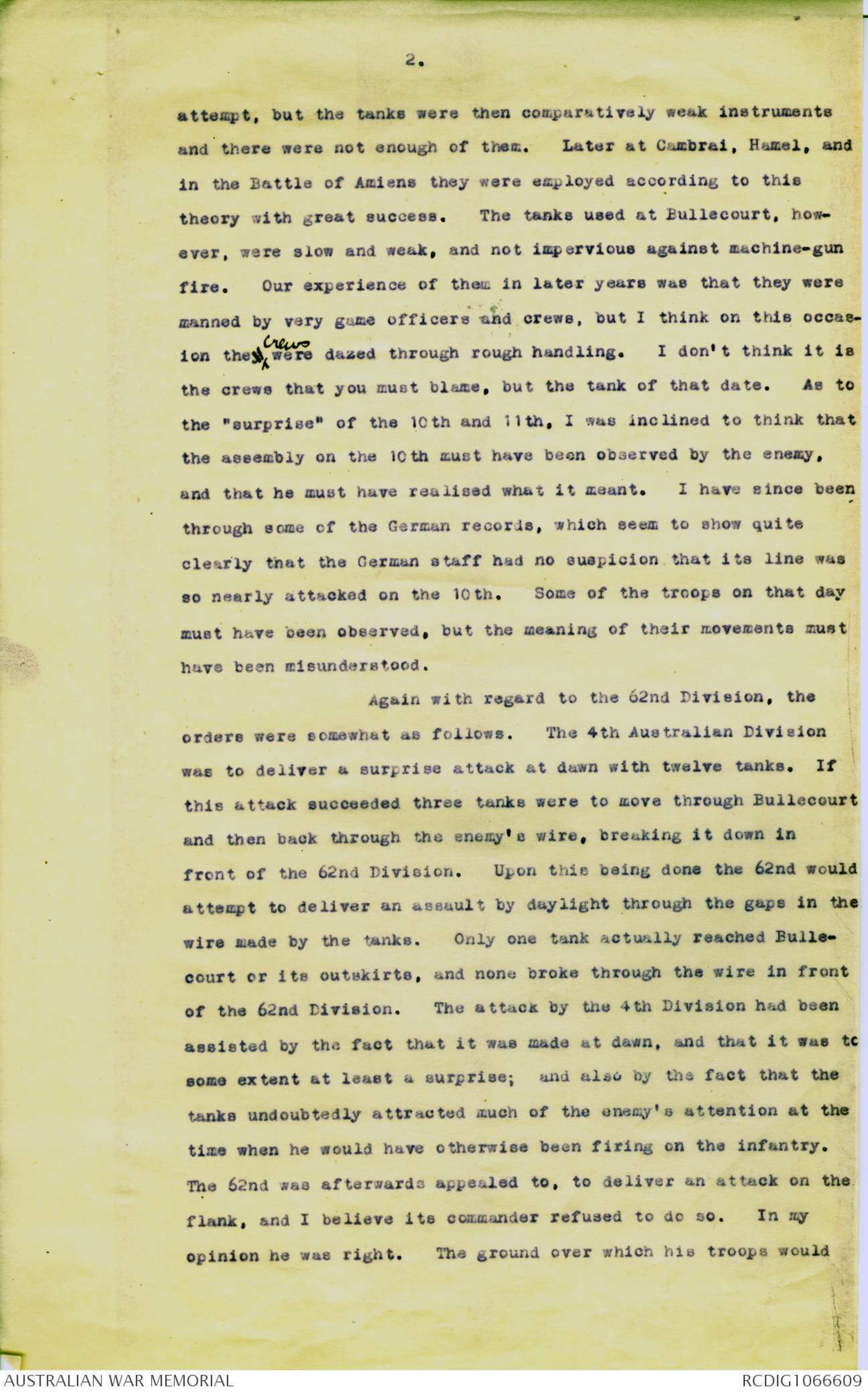
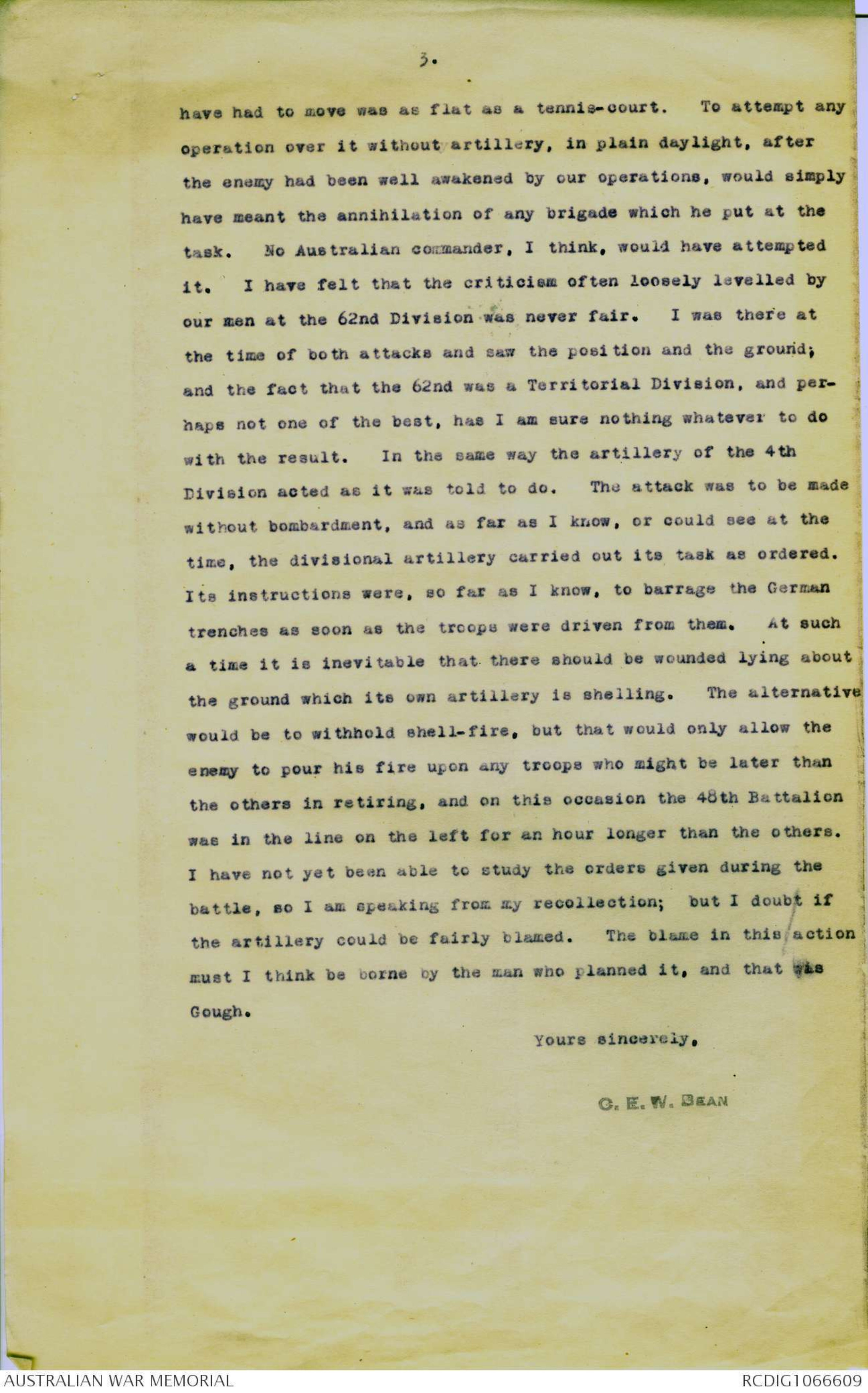
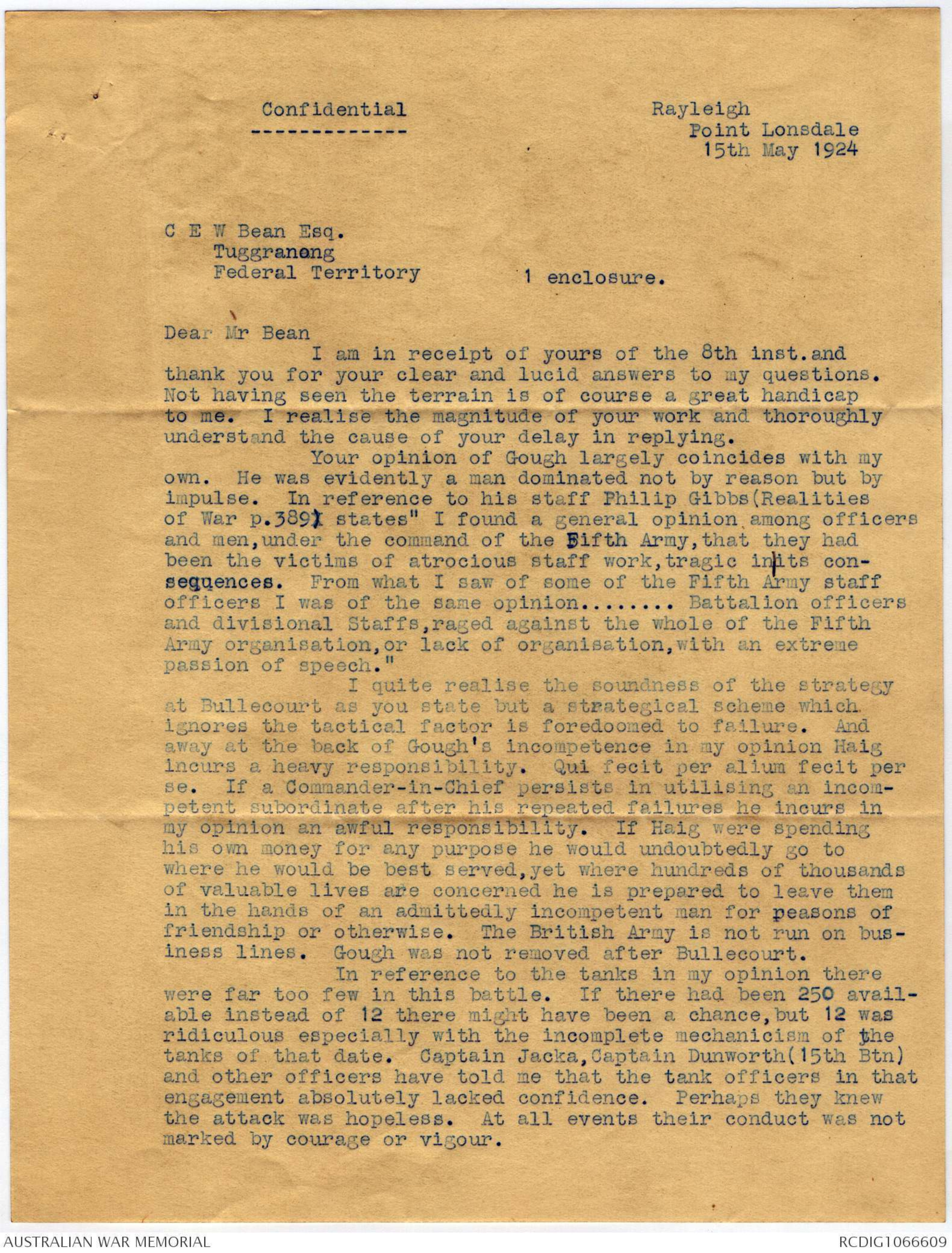
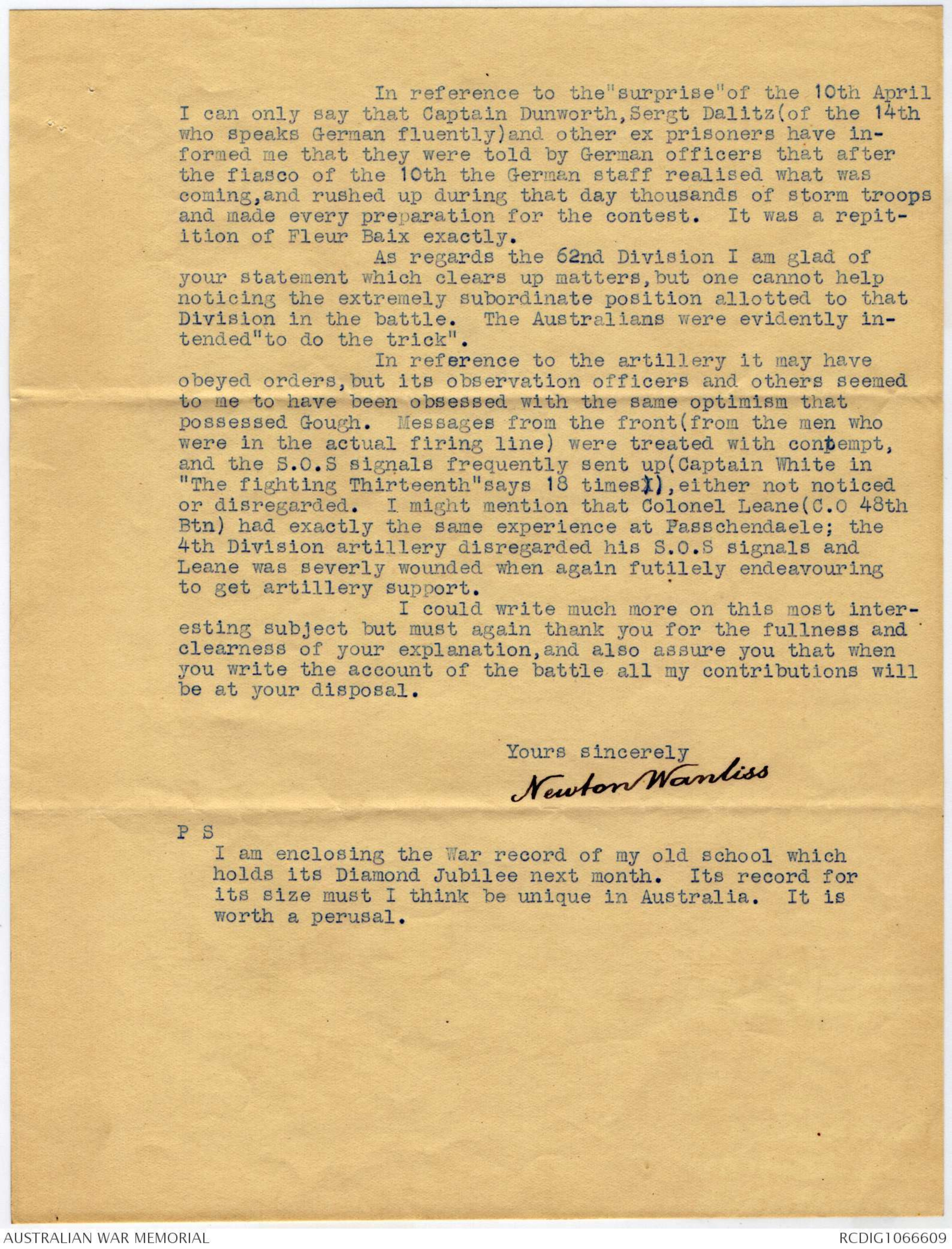
FL.4151
5474.
10 February 1930.
A.R. Compton, Esq.,
"Beverley",
24, Balmain Road,
Leichardt, N.S.W.
Dear Sir,
I am writing up the narrative of the First Battle of
Bullecourt for the Official History. Captain Gardiner happened
to mention the other day that, in the middle of this scrap, you
came to him with a ration of rum, which you insisted on his
drinking. I had never heard the story before, and would be grateful
if you would let me know how the rum got through and how it
was distributed.
I enclose a stamped and addressed envelope for your reply.
Yours faithfully,
C.E.W. Bean
Official Historian.
67
"Beverley"
211 Balmain Rd
Leichardt
12.2.30
Mr C.E.W Bean.
Official Historian.
(5474)
Dear Sir.
Well I remember asking Capt.
Gardiner to have a nip of rum. Having made
it a practice to carry a water bottle full of
same when in the line, experiance taught
me that many men required a bracer
when conditions had been warm, or were
warm. There was no rum brought forward
to us whilst we were in the
Hindenburg line 11-4-17 to my knowledge. In
fact not even a bomb. let alone rum
came forward. Capn. Gardiner was one of
many when I gave a nip to that day
In fact Mr Dean to be exact, I had
two bottles full of rum on this occassion
because, having gone to do this attack.
on the 10-4-17 were turned back & whilst
on the return journey, I soon ran out
of rum so deemed it wise to carry more
knowing we were in for a good dusting
up, at least that was my thoughts
68
When we were told that the attack would
be on the following morning. that is
how the rum was there. I always
remember the stunt as Reincourt.
because the 13th & 16th attacked there.
However should you wish it I could
give you a good detail of the whole
affair. Trusting I have given you the
desired information. By the way I had
quite a job to parcel up Capt Garniner
to has the nip. Why I do not know,
Dean inclined to think Cap Gardiner though I was having
a joke with him, I may add I never
drank rum the smell was enough
for me.
Yours' faithfully
Albert R, Compton
[*Bullecourt*]
Rayleigh
Point Lonsdale
29th March 1924
C. E. W Bean Esq.
Historian
Tuggranong
Federal Territory
via Queanbeyan N SW
Dean Mr Bean
Mr Barrett has written and informed me that he has
some maps kindly given ^by you to him for me, and which I will get next
time I go to town. I highly appreciate your kindness and as I
have said before any military correspondence I have will always
be at your disposal. I trust Mr Barrett's retainer can be extended
beyond 30th June next. His assistance has been of great
value to me.
You were good enough to offer to assist me and whilst
I don't want to abuse your offer I would like some assistance in
reference to the first battle of Bullecourt which I am just about
to describe. I will give you my general impressions and then
indicate one or two points on which I would like enlightenment.
I look on General Gough as a man of considerable
courage (but of mediocre intellect, and saturated with that prevalent
optimism which in the late war would have aften been grotesque
but for its continually tragic consequences. He was also
a lazy man disinclined to, intellectual thinking,obstinate, and
backed up by an extremely ^inefficient staff. The success of Allenby's offensive
at Arras was grossly overestimated by that officer (also an
optimist) and his communications to Gough led that General to think
that the German army was on the point of disintegration,and that
he (Gough) could break through on this front without trouble and
chase them to Berlin, incidentally gaining a great reputation.
This idea became an obsession with Gough, and no evidence to the
contrary was allowed to interfere with ^this alluring picture. Australian
protests were treated with contempt and he determined at all costs
to "bullock" his idea through.
The plan of a surprise attack with tanks seems to
have originated with Major Watson their commander, and to have
been adopted off hand by Gough. After the fiasco of the 10th
April when the show had been given away and a surprise was no
longer possible, why the attack was not abandoned — as surprise
was the "essence of the contract" and especially after the Fleurbaix
example–is beyond me. Some say that Colonel Peck (14th) then declined
to accept responsibility for the result. I understand
the Germans took advantage of the interval (between 10th and 11th
April) to bring up thousands of storm troops,and made the attempt
absolutely impossible.
The tanks appear to have failed very badly. I recognise
they did not receive fair play and the personnel was exhausted,
but their effort (as a body)appears to have been very fe
feeble.
The 62nd Division's part in the battle on the left appears
to have been purely ornamental. It is alleged that that Division
was not to attack Bullecourt until it had been attacked by the
46th and 48th Battalions A I F. In other words two Battalions
were to clean out the position and then a division was to walk
in after the job had been done. Assuming that to be correct the
the 62nd seems to have made no effort even to assist the Australians
in the retreat. That division failed badly again on the 3rd
May and its record is not a creditable one.
The 4th Division Artillery appears to have been very p
poorly handled in the engagement, the sum total of its achievement
being practically to butcher a lot of our wounded at the end of
the battle.
I would feel obliged if you could advise me how far my
general impressions are correct and give me what details you feel
you can–consistently with your duties as official historian—in
reference to the tanks, the part played by the 62nd Division, and
our 4th Division artillery. The story of the Battle has never
(so far as I am aware) been written and I am very anxious to get
a clear ^and accurate grasp of the facts. Thanking you in anticipation,
Yours sincerely
Newton Wanliss
8th May, 1924.
CONFIDENTIAL.
N. Wanliss, Esq.,
"Rayleigh",
Point Lonsdale, Vic.
Dear Mr. Wanliss,
I am sorry that I have left your questions of
March 29th pass so long without an answer. I don't really know
enough about Gough to be sure of the nature of his intellect,
but he had no grasp of the principles which were necessary for
the control of great offensives in the late war. He was a cavalry
officer and would have been an excellent dashing patrol-leader,
but he made many gross mistakes with his army. His
worst fault, we used to think, was his tendency to undertake
partial and disjointed attacks on narrow sectors. His chief-of-staff
cannot I think have been an officer of sufficient grasp, or
he would probably have prevailed on his general to prevent some
of these attacks. I wouldn't say, however, that his staff was
extremely inefficient. I personally think that Gough was a
very bad general, impulsive, and thoughtless, and he probably
made great difficulties for his staff.
Gough's notion at Bullecourt was to break in
behind the rear of the enemy. Strategically it was a good move
but he overlooked all the tactical diffioulties, and his plan of
attacking the Bullecourt re-entrant was an impossible one. I
think he was probably anxious to have a hand in the Arras fighting,
possibly from mixed motives, but especially because he was
optimistic about his chance of breaking in upon the enemy's
flank and rear. Birdwood of course thoroughly disliked the
Bullecourt plan, but could not prevail with Gough.
The Tank Corps had always been urging that the
proper way for using tanks was in mass. This was the first
2.
attempt, but the tanks were then comparatively weak instruments
and there were not enough of them. Later at Cambrai, Hamel, and
in the Battle of Amiens they were employed according to this
theory with great success. The tanks used at Bullecourt, however,
were slow and weak, and not impervious against machine-gun
fire. Our experience of them in later years was that they were
manned by very game officers and crews, but I think on this occasion
they ^crews were dazed through rough handling. I don't think it is
the crews that you must blame, but the tank of that date. As to
the "surprise" of the 10th and 11th, I was inclined to think that
the assembly on the 10th must have been observed by the enemy,
and that he must have realised what it meant. I have since been
through some of the German records, which seem to show quite
clearly that the German staff had no suspicion that its line was
so nearly attacked on the 10th. Some of the troops on that day
must have been observed, but the meaning of their movements must
have been misunderstood.
Again with regard to the 62nd Division, the
orders were somewhat as follows. The 4th Australian Division
was to deliver a surprise attack at dawn with twelve tanks. If
this attack succeeded three tanks were to move through Bullecourt
and then back through the enemy's wire, breaking it down in
front of the 62nd Division. Upon this being done the 62nd would
attempt to deliver an assault by daylight through the gaps in the
wire made by the tanks. Only one tank actually reached Bullecourt
or its outskirts, and none broke through the wire in front
of the 62nd Division. The attack by the 4th Division had been
assisted by the fact that it was made at dawn, and that it was to
some extent at least a surprise; and also by the fact that the
tanks undoubtedly attracted much of the enemy's attention at the
time when he would have otherwise been firing on the infantry.
The 62nd was afterwards appealed to, to deliver an attack on the
flank, and I believe its comander refused to do so. In my
opinion he was right. The ground over which his troops would
3.
have had to move was as flat as a tennis-court. To attempt any
operation over it without artillery, in plain daylight, after
the enemy had been well awakened by our operations, would simply
have meant the annihilation of any brigade which he put at the
task. No Australian commander, I think, would have attempted
it. I have felt that the criticism often loosely levelled by
our men at the 62nd Division was never fair. I was there at
the time of both attacks and saw the position and the ground;
and the fact that the 62nd was a Territorial Division, and perhaps
not one of the best, has I am sure nothing whatever to do
with the result. In the same way the artillery of the 4th
Division acted as it was told to do. The attack was to be made
without bombardment, and as far as I know, or could see at the
time, the divisional artillery carried out its task as ordered.
Its instructions were, so far as I know, to barrage the German
trenches as soon as the troops were driven from them. At such
a time it is inevitable that there should be wounded lying about
the ground which its own artillery is shelling. The alternative
would be to withhold shell-fire, but that would only allow the
enemy to pour his fire upon any troops who might be later than
the others in retiring, and on this occasion the 48th Battalion
was in the line on the left for an hour longer than the others.
I have not yet been able to study the orders given during the
battle, so I am speaking from my recollection; but I doubt if
the artillery could be fairly blamed. The blame in this action
must I think be borne by the man who planned it, and that wis
Gough.
Yours sincerely.
C. E. W. BEAN
Confidential
Rayleigh
Point Lonsdale
15th May 1924
C E W Bean Esq.
Tuggranong
Federal Territory
1 enclosure.
Dear Mr Bean
I am in receipt of yours of the 8th inst.and
thank you for your clear and lucid answers to my questions.
Not having seen the terrain is of course a great handicap
to me. I realise the magnitude of your work and thoroughly
understand the cause of your delay in replying.
Your opinion of Gough largely coincides with my
own. He was evidently a man dominated not by reason but by
impulse. In reference to his staff Philip Gibbs (Realities
of War p.389) states" I found a general opinion, among officers
and men, under the command of the Fifth Army, that they had
been the victims of atrocious staff work, tragic in/its consequences.
From what I saw of some of the Fifth Army staff
officers I was of the same opinion........ Battalion officers
and divisional Staffs, raged against the whole of the Fifth
Army organisation, or lack of organisation, with an extreme
passion of speech."
I quite realise the soundness of the strategy
at Bullecourt as you state but a strategical scheme which
ignores the tactical factor is foredoomed to failure. And
away at the back of Gough's incompetence in my opinion Haig
incurs a heavy responsibility. Qui fecit per alium fecit per
se. If a Commander-in-Chief persists in utilising an incompetent
subordinate after his repeated failures he incurs in
my opinion an awful responsibility. If Haig were spending
his own money for any purpose he would undoubtedly go to
where he would be best served, yet where hundreds of thousands
of valuable lives are concerned he is prepared to leave them
in the hands of an admittedly incompetent man for reasons of
friendship or otherwise. The British Army is not run on business
lines. Gough was not removed after Bullecourt.
In reference to the tanks in my opinion there
were far too few in this battle. If there had been 250 available
instead of 12 there might have been a chance, but 12 was
ridiculous especially with the incomplete mechanicism of the
tanks of that date. Captain Jacka, Captain Dunworth (15th Btn)
and other officers have told me that the tank officers in that
engagement absolutely lacked confidence. Perhaps they knew
the attack was hopeless. At all events their conduct was not
marked by courage or vigour.
In reference to the"surprise" of the 10th April
I can only say that Captain Dunworth, Sergt Dalitz(of the 14th
who speaks German fluently)and other ex prisoners have informed
me that they were told by German officers that after
the fiasco of the 10th the German staff realised what was
coming,and rushed up during that day thousands of storm troops
and made every preparation for the contest. It was a repitition
of Fleur Baix exactly.
As regards the 62nd Division I am glad of
your statement which clears up matters, but one cannot help
noticing the extremely subordinate position allotted to that
Division in the battle. The Australians were evidently intended
"to do the trick".
In reference to the artillery it may have
obeyed orders, but its observation officers and others seemed
to me to have been obsessed with the same optimism) that
possessed Gough. Messages from the front (from the men who
were in the actual firing line) were treated with contempt,
and the S.O.S signals frequently sent up(Captain White in
"The fighting Thirteenth"says 18 times X), either not noticed
or disregarded. I might mention that Colonel Leane (C.O 48th
Btn) had exactly the same experience at Passchendaele; the
4th Division artillery disregarded his S.O.S signals and
Leane was severly wounded when again futilely endeavouring
to get artillery support.
I could write much more on this most interesting
subject but must again thank you for the fullness and
clearness of your explanation, and also assure you that when
you write the account of the battle all my contributions will
be at your disposal.
Yours sincerely
Newton Wanliss
P S
I am enclosing the War record of my old school which
holds its Diamond Jubilee next month. Its record for
its size must I think be unique in Australia. It is
worth a perusal.
 Deb Parkinson
Deb ParkinsonThis transcription item is now locked to you for editing. To release the lock either Save your changes or Cancel.
This lock will be automatically released after 60 minutes of inactivity.